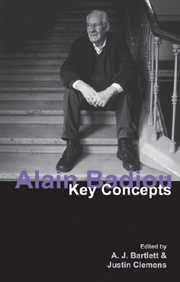Book contents
- Frontmatter
- Contents
- Contributors
- Acknowledgements
- Abbreviations
- Miscellaneous Frontmatter
- Introduction: Badiou's form
- 1 Biography and early works
- PART I THE FOUNDATIONS OF BADIOU'S THOUGHT
- PART II BADIOU'S KEY CONCEPTS OR “CONDITIONS”
- PART III BADIOU'S ENGAGEMENT WITH KEY PHILOSOPHERS
- Afterword: Badiou's futures
- Bibliography
- Index
Introduction: Badiou's form
- Frontmatter
- Contents
- Contributors
- Acknowledgements
- Abbreviations
- Miscellaneous Frontmatter
- Introduction: Badiou's form
- 1 Biography and early works
- PART I THE FOUNDATIONS OF BADIOU'S THOUGHT
- PART II BADIOU'S KEY CONCEPTS OR “CONDITIONS”
- PART III BADIOU'S ENGAGEMENT WITH KEY PHILOSOPHERS
- Afterword: Badiou's futures
- Bibliography
- Index
Summary
Alain Badiou is perhaps the world's most important living philosopher. Few, if any, contemporary philosophers display his breadth of argument and reference, or his power to intervene in debates critical to both analytic and continental philosophy. Badiou's influence upon contemporary philosophy, psychoanalysis, ontology, history and philosophy of science, film studies, art history, theatre studies, political philosophy and even geography has grown exponentially in the last few years alone. Badiou's work is now a constant reference for already-established figures such as Jacques Rancière, Giorgio Agamben and Slavoj Žižek, among others, and references to his work can be found in an enormous range of scholarly and non-scholarly texts. As a result, Badiou's work has begun to come under more intense scrutiny by those Academicians who understand their first duty to be to critique rather than to intelligibility and whose talent for negation sees them continue to conflate politics with philosophy, mathematics with authority, history with dialectic, and truth with knowledge – whether wilfully or “sophistically”. If this current volume seeks to clarify and contextualize Badiou's work as respectfully as possible, it cannot avoid being at once a contribution to the explication, to the extension and to the academic institutionalization of Badiou's work.
Badiou's work emerges from what we might call a “post-poststructural moment”. That is, his work both follows on from and confronts that of Jean-Paul Sartre, Jacques Lacan, Louis Althusser, Michel Foucault, Jacques Derrida, Gilles Deleuze, Jean-François Lyotard and others in a French context; but it also confronts some key elements of the predominantly anglophone analytic context as well, including the work of Ludwig Wittgenstein, W. V. Quine, Richard Rorty, Donald Davidson and others.
- Type
- Chapter
- Information
- Alain BadiouKey Concepts, pp. 1 - 7Publisher: Acumen PublishingPrint publication year: 2010

